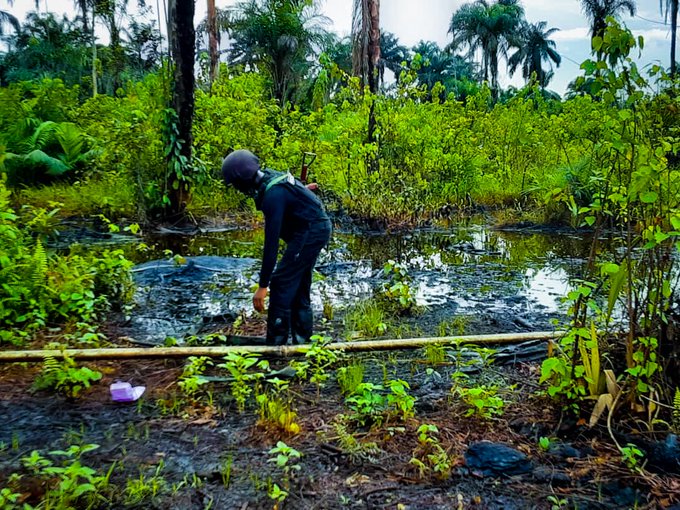An oil spill has been reported at the Shell Petroleum Development Company (SPDC) loading terminal in Bonny, Rivers State, causing serious concerns for local communities and the environment.
The spill was first noticed on Saturday, December 14, 2024, when a pipeline ruptured at the SPDC terminal, located in the heart of the Niger Delta.
The Nigerian Maritime Administration and Safety Agency (NIMASA) confirmed the incident in a statement issued on Sunday afternoon.
According to NIMASA, the ruptured pipeline caused a significant leak of crude oil, which spilled into the surrounding waters and reached the shoreline.
“The spill was caused by a ruptured pipeline. SPDC acted quickly to shut down the affected pipeline and deployed containment booms to limit the spread of the oil,” the statement read.
Containment booms are floating barriers used to contain the spread of spilled oil, helping to protect nearby communities and wildlife.
NIMASA added that it was actively monitoring the situation from its emergency operations center. The agency is also working with SPDC and other stakeholders to assess the damage caused by the spill and plan the next steps for recovery.
Local residents and environmentalists are deeply concerned about the impact of the spill on the fragile ecosystem of the Niger Delta. The region has experienced several oil spills in the past, with devastating effects on the environment and local livelihoods.
“The oil spill has reached the shoreline, and we are worried about the health of our rivers and fish. This is not the first time we have seen this happen,” said a local fisherman, who wished to remain anonymous.
The Bonny region, known for its rich biodiversity and large fishing communities, has suffered repeated oil spills in recent years, which have severely damaged both the environment and the economy. Many local fishermen depend on the clean waters of the area to catch fish and support their families.
The oil spill is also expected to affect other industries in the region, including agriculture and tourism, which rely on a healthy ecosystem.
“The effects of this spill could be far-reaching. It is crucial that the government and oil companies take stronger measures to prevent future spills,” said Emeka Okafor, a local environmental activist.
SPDC has stated that it is committed to cleaning up the spill and restoring affected areas as soon as possible.
“SPDC is fully engaged in efforts to contain and clean up the spill. We are working closely with the relevant authorities to minimize any environmental impact and ensure that the situation is addressed promptly,” the company said in a brief statement.
Despite these efforts, many residents remain skeptical about the effectiveness of the cleanup. Previous oil spills in the Niger Delta have taken years to fully remediate, and many communities feel that the oil companies and the government have not done enough to protect the region from such incidents.
NIMASA has urged members of the public to remain calm and assured them that the agency is committed to addressing the spill and minimizing its impact on the environment.
“Restoring the affected areas and ensuring the safety of the public is our top priority,” said Osagie Edward, NIMASA’s Head of Public Relations.
The oil spill comes just days after a major oil leak was reported in another part of the Niger Delta, highlighting ongoing concerns about the safety and maintenance of oil infrastructure in the region.
The Niger Delta, which is home to one of the largest oil reserves in the world, has long struggled with the effects of oil exploration, including spills, gas flaring, and pollution. The region’s oil-rich waters and lands have been the focus of numerous environmental protests and legal battles, as local communities demand better compensation and environmental protection measures from the oil companies.
In response to these growing concerns, both local and international environmental groups have called for more stringent regulations and oversight of oil operations in the region.

